The seminar was held on 26th October 2022 on “Pakistan & Argentina Relations” at the Quaid-e-Azam House Museum, Institute of Nation Building under the auspices of Karachi Council on Foreign Relations (KCFR) with his Excellency Mr. Leopoldo Francisco Sahores, Ambassador of Argentina to Pakistan. The event was moderated by Cdr (R) Sadeed A Malik, Secretary General/CEO KCFR.
Cdr (R) Sadeed A Malik – Secretary General/CEO, KCFR: Your Excellency, Leopoldo Francisco Sahores, Chairman, Members of the Board of Governors, Assalam-o-Alaikum, Buenos Dias and good morning. It is a great pleasure and an honor for me to welcome your Excellency to the Board of Governors of Karachi Council on Foreign Relations (KCFR). It is the second time that he is with us; earlier on, he was with us on a meeting on Zoom during COVID-19 period, and it was a great pleasure hearing him speak about trade and communication between Argentina and Pakistan.
Normally, I introduce Karachi Council on Foreign Relations but as you know it very well I will not go through that procedure – and we all know except for few, and those who do not know- I would like to tell them that His Excellency had a brilliant academic career and after that, he did his Masters in Environment and Development from Australian National University, then he joined the Foreign Service. He’s a career diplomat, he held very important positions in the Foreign Ministry and has been to Australia, Brazil, Environmental Division, MARCUSOR National Division, was Deputy Head of the Mission in Brazil and then he was Undersecretary for the Americas, Additional Secretary in the Foreign Office. Now, he was appointed in 2021 as the Argentinian Ambassador to Pakistan. Excellency, in today’s program we are looking forward to your address, and after the address our Chairman will give his concluding remarks. Before that, we’ll have a brief question and answers session. Your Excellency, please.
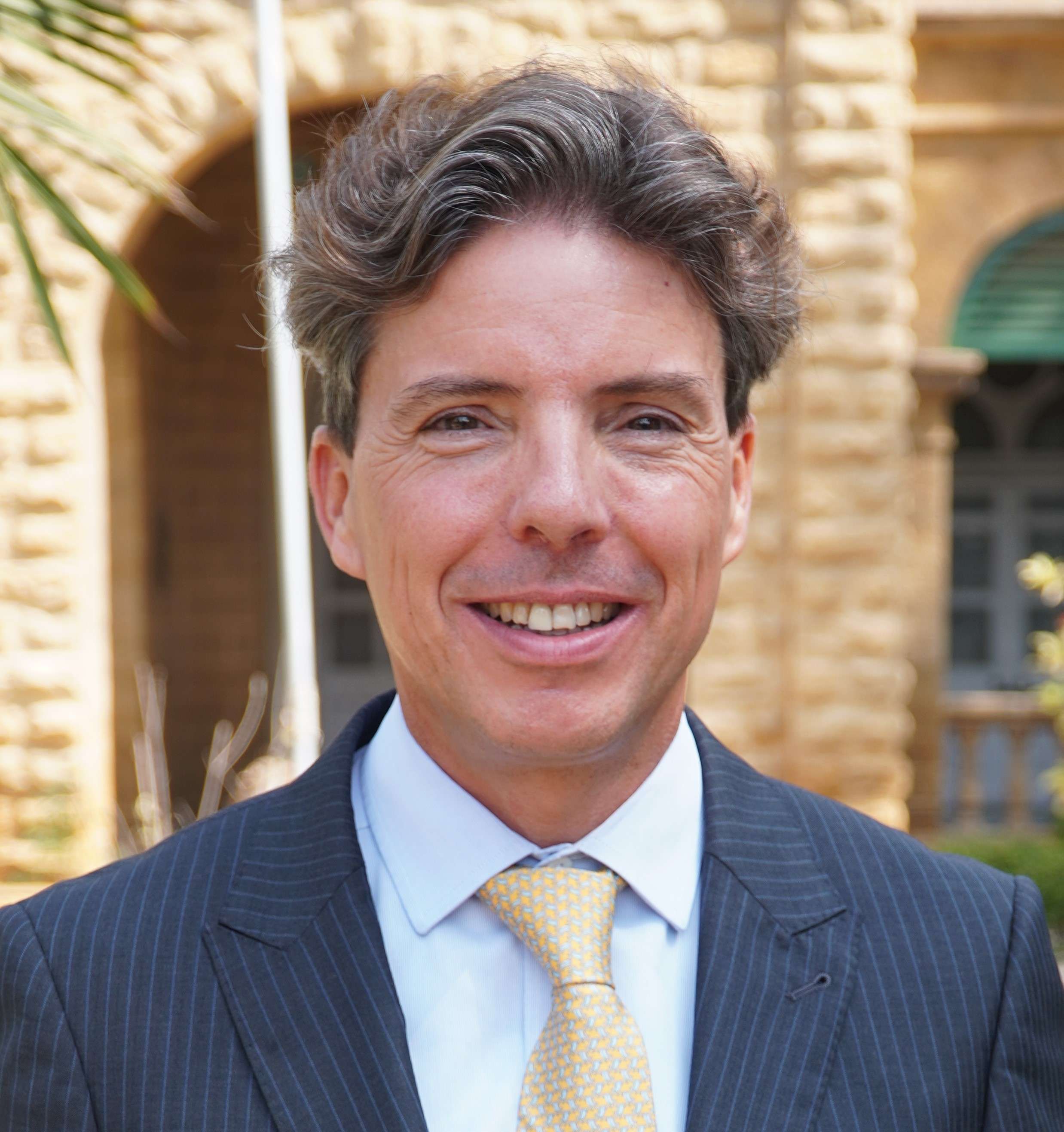
HE Mr. Leopoldo Francisco Sahores – Ambassador of Argentina to Pakistan: Thank you, so much and good morning. It’s a privilege to be once again with the Karachi Council on Foreign Relations and this time in this fantastic venue. I feel very privileged and honored to be here in such a historic place, not only for Karachi but for the whole country, so it’s an honor for us. I’m with Mr. Camilo Emesto Silberkasten, he’s our Deputy Head of Mission and Trade Attaché. We arrived in Karachi on Sunday evening, and we’ve been having very productive meetings with government officials, companies and other institutions. We will stay till today evening, so it’s been very productive as I’ve said, and lots of opportunities both in the private sector and in cooperation with government in Sindh and Karachi in particular. So, I’m going to go into more formal setting if you allow me. I hope, I mean those who were present in the Zoom meeting might recall a few things that I’m going to tell right now, but overall, I think it’s good to go back to these concepts.
Thank you so much, Mr. Chairman and good morning to all the members of Board of Governors of the Karachi Council on Foreign Relations. It’s a pleasure to be here once again. So last year we had this webinar in December. By that time, I was relatively new – only seven months – so now it’s been more than a year – a year and five months – so I have a better picture of Pakistan and what Pakistan has to offer to the world and in particular to Argentina, and how we can become closer partners.
Last year we were celebrating 70 years of diplomatic relations with Pakistan and the topic of last year’s webinar was about Future Aspirations in the Bilateral Relations, so from that webinar in December last year till now, I think we have managed to identify precisely what those challenges are and how we can work together towards addressing those challenges and make a sound relationship with Pakistan. Relations with Pakistan have turned 71 years in October this year. It was decided in 1951 to establish bilateral relationship between both countries. This was concluded through an exchange of notes in Washington DC and later in 1951 a presidential decree by president in Argentina approved the establishment of the Consulate in Karachi, so the counselor was mandated to find the premises for the future embassy. At the beginning, we were interacting with Karachi authorities and later on in Rawalpindi, and the embassy opened in Islamabad on January the 1st, 1968.
Of course, you might be aware of a landmark moment in the relationship between Argentina and Pakistan was back in ‘71. That was on the occasion of the adoption of a Security Council Resolution Number 303, a process in which Argentina played a crucial role. At that moment, the UN Security Council was unable to pronounce itself due to breakdown of the former Union of Soviet Socialist Republics and it was unable to pronounce on the situation arising from the armed conflict between Pakistan and India, and the following independence of former Eastern Pakistan. So the Argentine delegate to the UN Security Council at that moment – who was a prominent Argentine Diplomat – was determined to make every effort to halt the military conflict and prevent the intervention of big international players in the subcontinent, and he did so by resorting to the Union for Peace Resolution from 1950 which enables the intervention of the General Assembly when the Security Council fails to exercise its primary responsibility for the maintenance of international peace and security because there was a lack of unanimity from its permanent members.
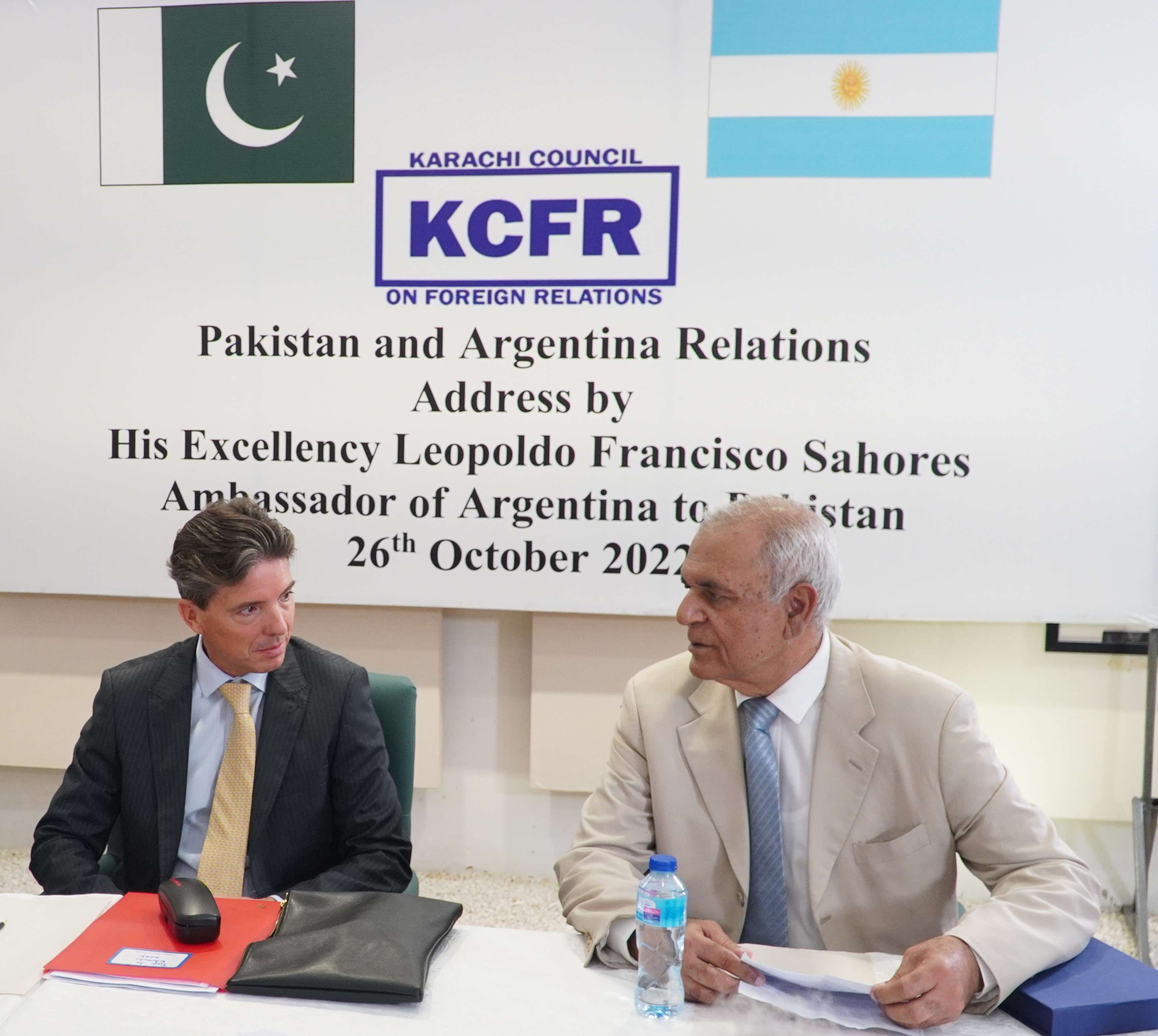
This was one of the 10 emergency sessions in which the General Assembly had been convened under the Union for Peace Resolution. As a result, the UN General Assembly Resolution was adopted, recommending an immediate cease of fire and the withdrawal of the troops and return of refugees, and as a demonstration of appreciation from the Pakistan government to the Argentine government, in 1973, a park was called Argentine Park in Islamabad in a very central area of the capital. Last year I had the pleasure with the then-minister of Foreign Affairs, Mahmoud Qureshi to be in a Tree Plantation Ceremony to commemorate seven decades of friendship between our two countries. And let me tell you that in the 70s while you were experiencing this situation with India and Bangladesh, Argentina was experiencing lots of issues and troubles with neighboring countries; both Brazil – mainly Brazil and Chile. In 1978, Argentina was at the brink of a war with Chile and there were a lot of tension and misunderstanding and lack of trust between Argentina and Brazil, both countries were at that moment already capable of developing nuclear energy, of course, for peaceful uses, but there was still this lack of trust between both countries.
But efforts from both sides, Argentina and Brazil, Argentina and Chile plus mediation of international figures like the Pope in ‘78 prevented the war with Chile and paved the way for a longstanding and beneficial relationship with Brazil. In the mid-80s, with Brazil, we set up what is a success case, the ABACC which is Brazilian-Argentine Agency for Accounting and Control of Nuclear Materials in order to guarantee that nuclear energy is used for peaceful purposes. So this is, I think, a very successful case where we can share our experience and draw some conclusions, because as I said, we were having these very difficult issues with neighboring countries and friendly countries and of course Brazil and Chile – Brazil is the largest trade partner of Argentina and Chile ranks in the first five countries. Because Argentina and Brazil are the largest countries in South America, Argentina is the third largest economy in Latin America – being Brazil, Mexico and Argentina. Because we were able to build a relationship with trust and confidence between both governments, Argentina and Brazil set the founding stone for what later became the MERCOSUR in 1991. MERCOSUR is an economic common market; Brazil and Argentina being the largest partners, and also includes Paraguay, Uruguay and Venezuela as part of MERCOSUR, it joined later on but because of political circumstances its participation has been suspended since 2017, but it remains a partner and Bolivia is in the process of becoming a full member so MERCOSUR, it’s been more than 30 years already, trade between Argentina and Brazil- the main partners – has increased tenfold since those days.
Brazil is one of the main investors in in Argentina, so I think this is a success case, as I’ve said, a success story and something that can be of interest from institutions like yours to draw some lessons bearing in mind the subcontinent context. Just to give you a glimpse, a few days back we had a meeting with the Karachi Chamber of Commerce and Industry and one of the issues that arose was whether Argentina and Pakistan have a free trade agreement or whether that’s possible and the way that Argentina relates to other countries in terms of trade is through MERCOSUR; it’s a little bit like the EU, so EU negotiates agreements as a bloc, MERCOSUR negotiates agreements as a bloc as well. By the way, Pakistan was interested in this. We had some talks; this is something on the agenda. So just to go quickly, we see a lot of shared values and common positions in multilateral forums, we thank the constant support of Pakistan for the resumption of negotiations between Argentina and the United Kingdom in order to find a peaceful and definitive solution to the sovereignty dispute related to the Malvinas Island. You might, of course, recall the ‘82 war between the UK and Argentina and we are very grateful because Pakistan, I think, it’s currently the head of the G77 plus China Group and was very supportive in the adoption of a resolution this year on the Malvinas Island matter. So, from those early days till today, interaction between both countries was mostly focused on multilateral issues – a great deal of understanding and agreement on global topics like climate change, South-South cooperation, trade and development which continue until today. Then on top of that, there has been an institutional framework to develop a bilateral agenda.
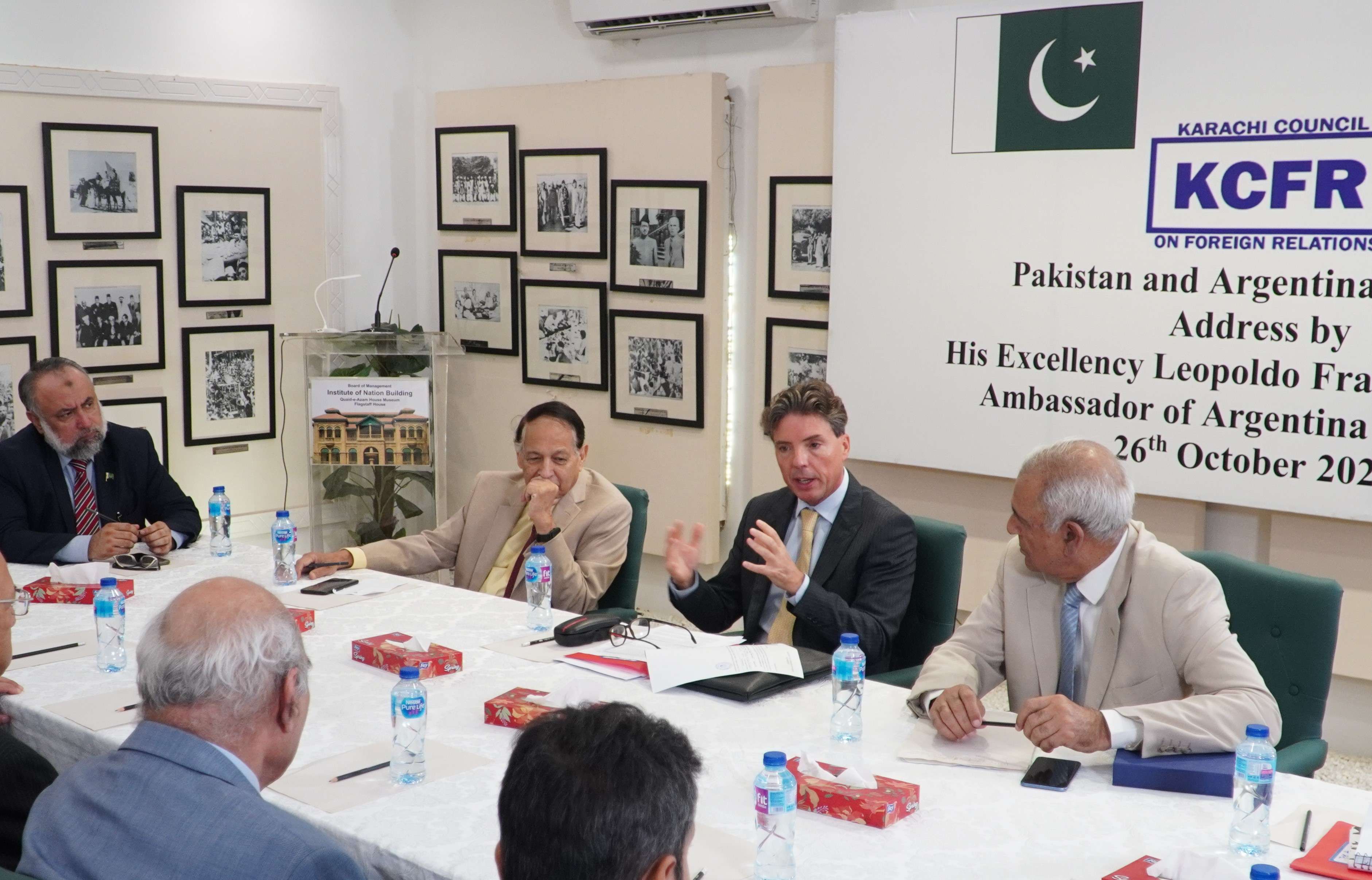
From our webinar experience till now, lots of things have happened in the global arena, we have the Ukraine situation which has triggered this hike in energy prices and Pakistan is currently suffering the consequences, this has an impact on food supply and commodities and let me tell you that Argentina can actually benefit and can help countries like Pakistan to overcome this situation. Argentina; because we are a huge agricultural country, could fit up to 400 million people, we have the resources and the land and crops enough to provide this kind of support, we have huge gas reserves, but of course we are, like Pakistan, very dependent on foreign investment. There’s a project to build a pipeline from these non-conventional gas reserves, but we need this investment to both build the pipeline and then build LNG processing plant. Once we have that in place we will be able to stop – like you – importing LNG, which in our case is much more expensive than yours because of the distance but this current crisis is also a window of opportunity for Argentina, so there’s a lot of expectations from global players being the US and EU on the potential of Argentina. Because Argentina and Latin America is a peaceful region, there is no war amongst our countries. I’ve just mentioned that we had an institutional framework to develop the bilateral agenda, lots of agreements on cooperation on various fields which were negotiated between 1983 until 2014.
I define myself as a practical person, I like to set targets and try to work towards achieving those targets and delivering, so I’m a little bit reluctant, although it’s important to have this institutional framework, it’s more important to achieve outcomes. What we have decided, or what I try to be my footprint in this tenure is trying to identify concrete cooperation projects between both countries and starting to build business-to-business connections. I think it’s preferable to have these business-to-business contacts and then set up Chambers of Commerce and business forums. I think it’s more important to work on concrete projects. So, trade between both countries remains low and I think there’s a lot of potential to increase it. This year, we should be around – both ways – at$177 million, which is not a lot, surplus is on our side, we mainly export commodities to your country, though there are some niche markets and some niche exports for pharma products and of course from Pakistan, we mainly import textiles and there’s some sports goods and some surgical equipment where I think there are a lot of opportunities for Pakistan.
Last time in the webinar, we were discussing about how Argentina can help Pakistan to become a more efficient agricultural country. When we look at world ranks, Pakistan ranks in the top 10 or top five when it comes to milk production, beef production, cattle, whatever. But of course, there are some issues about productivity and efficiency, that’s why you are so dependent on imports of commodities. Last time I was talking about Argentina’s grain storage solutions. We have been working very closely with the Punjab government, the federal government through PASSCO and we are going to find in Sindh, authorities and Pakistan Trade Corporation and private partners in Sindh and Karachi, the right people to bring this technology to Pakistan.
Another area where I think Argentina, being an agricultural country can help Pakistan, is in the Foot and Mouth Disease Control which affects cattle and this is what prevents Pakistan to become a net beef exporter, because you have all the potential but you have this disease; we had the disease back in Argentina but we were able, I think, 20 years ago to eliminate this disease. There are some Argentine companies who manufacture FMD vaccine, so we are in talks with the government and private partners here to see whether we can bring this vaccine and start selling it. But this is not about just exporting product, this is about joint ventures and Argentine companies coming into Pakistan because Pakistan has a huge domestic market; a growing domestic market and also, it’s not only Pakistan, it’s surrounding areas and we have to take advantage of the logistical corridors that Pakistan is working on to connect with Central Asia.
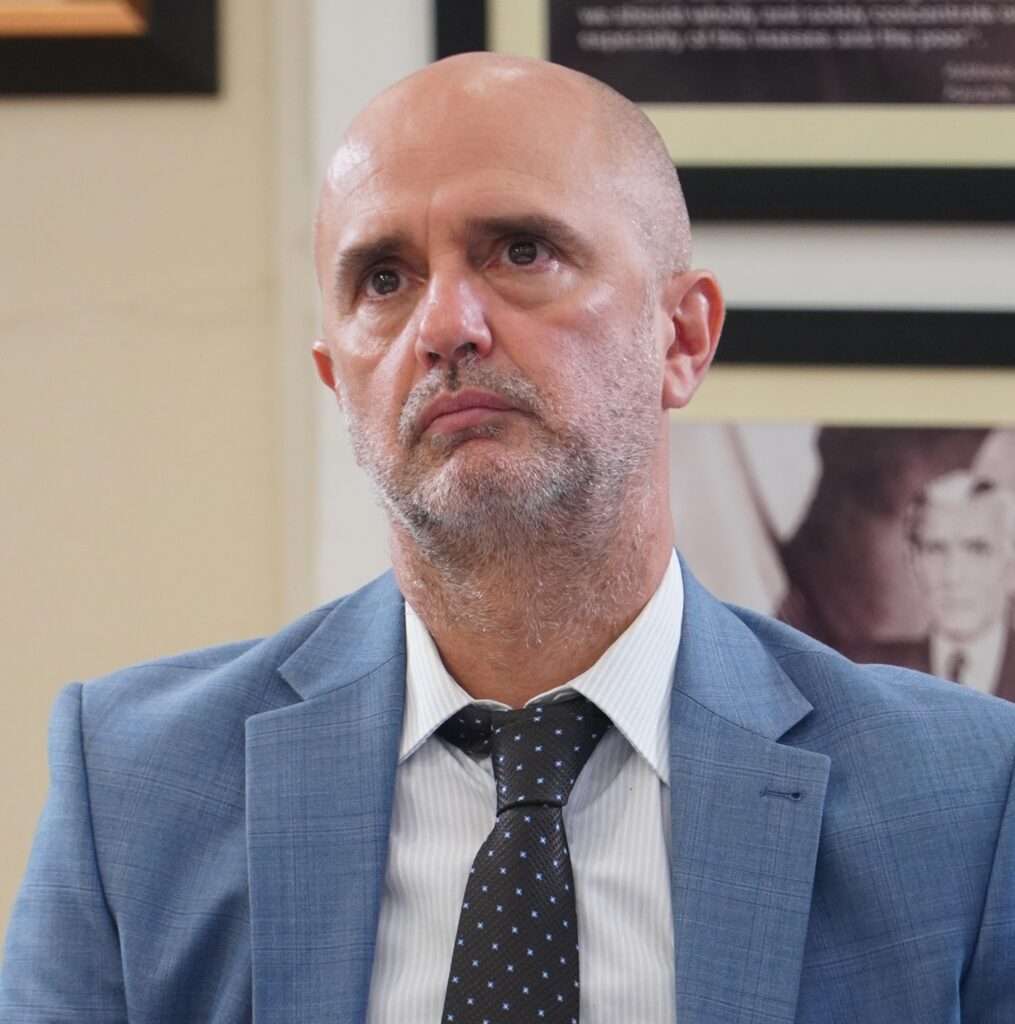
Of course, this is not about only about trade, we have to promote our culture, we and our Pakistani diplomat colleagues, we have to work together also to promote Pakistani culture in Argentina because this is not just a one-way, it’s two-way. I think nobody knows about Argentine arts in Pakistan, hardly anyone knows about Argentine literature so we are planning, I hope, to bring writers from Argentina to the Lahore Literary Festival which will take place next February and now I’m also talking to the Lahore Biennale Expo which will take place in late 2023 or beginning of 2024. This time around, I haven’t had the chance to meet cultural organizations in Karachi but next time I will definitely want to meet them, so if you have any ideas on how we can collaborate with festivals, cultural festivals in Karachi, I would be very glad to hear from you because Karachi is a huge city.
You have, I understand, a film industry which is mainly concentrated in Karachi, I think there’s a lot of room for cooperation with Pakistan from Karachi on the cultural scene. We want to help to make Spanish a more spoken language in Pakistan. This is a very difficult task, so far there is just one university where Spanish is taught as a foreign language, it is in Islamabad. So, we are trying to encourage other universities, again; if you have any ideas or suggestions about universities in Karachi or more broadly in Sindh where they can start teaching Spanish, it will be fantastic. Spanish is an official UN language; more than 50 million people are speaking Spanish in the US and I think Spanish is the second or third largest language spoken on the internet these days. I would leave it here, of course person-to-person contact is very important, I wish we could promote and bring more tourists from Argentina and vice versa. Sports is another way to connect people from both countries and of course, we are a very renowned football country and there’s a project in which we are working to bring female football players to Pakistan to train female football players especially in deprived areas so I think that would be another successful case of people-to-people connection, and a better understanding. I thank you so much.
Cdr (R) Sadeed A Malik: Thank you, Excellency. Pakistan and Argentina have so many things in common vis-à-vis relationship with the neighbors. We have seen many ups and downs over there and Pakistan remains grateful to you for your help to Pakistan in UN on the Kashmir issue. One of the main commonalities we have, a great burden of loan from IMF and you too have a very similar loan. I know you are still repaying, and you had a default also in between, that was back in ‘21. How are you are handling it?
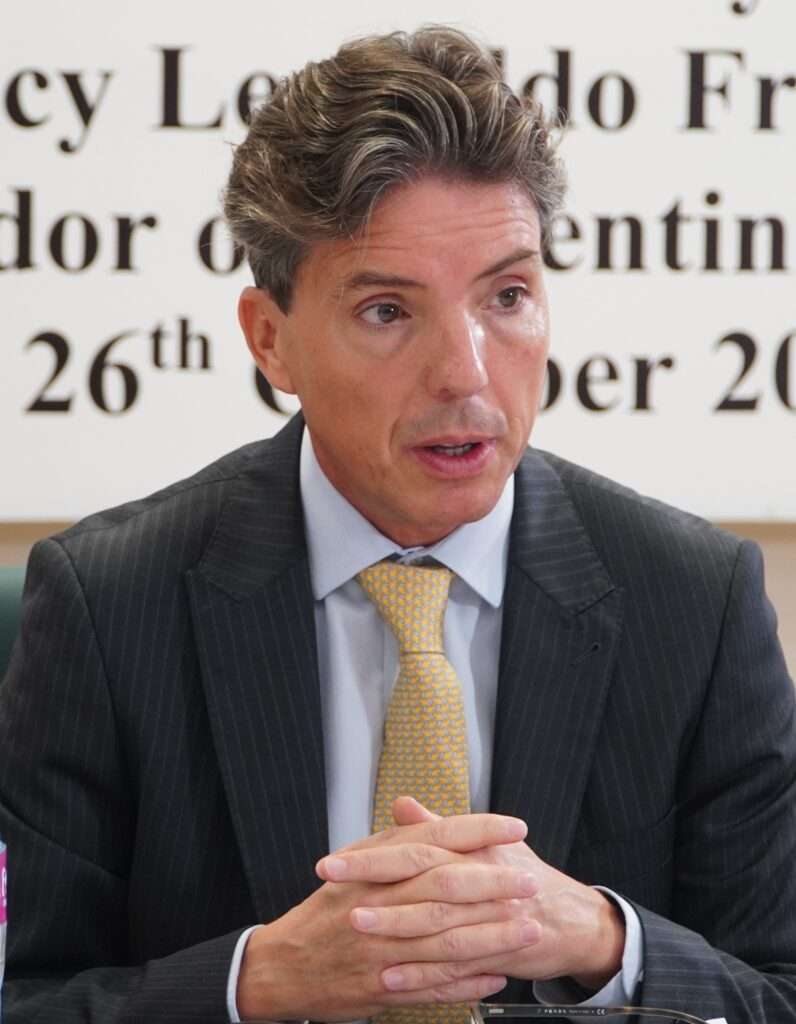
HE Mr. Leopoldo Francisco Sahores: Well, we have these negotiations rounds, like you have, I think our current program is as old as yours. It was started in 2018, yours was in 2018 or 2019. Much bigger as I’ve said, so we have these periodic rounds and negotiations. In our case, the full amount of money was already released, not like yours, that you have this tranche process. Of course IMF has a lot of conditions, lots of structural reforms that we have to undertake, I think that you are being more successful in introducing those reforms, we are lagging behind, the political situation in Argentina is very evolving I would say, I quite relate to Pakistan when it comes to politics because I listen here to colleagues from Europe or some other developed countries – there’s no dull moment in Pakistan, let me tell you there’s no dull moment in Argentina also; so negotiation with IMF, I think, we have already passed the second quarter review, and we are heading for the coming one but we have very tough targets.
Farooq Afzal, Member BoG, KCFR: Excellency, thank you very much for being with us and for your very comprehensive address on the relations between Pakistan and Argentina. Unfortunately, we do not have a very good trade relationship with you, Pakistan and Argentina’s trade relationship lacks a lot. In order to improve this, we would like to have a favor from you, an exchange of trade delegations. Unless we have frequent trade delegations, we will not be able to know about each other. Secondly, we can also have an exchange of students, it’s a matter of knowing each other’s culture and education system. Once we have good people-to-people contact, trade will follow. So why don’t you also support the establishment of a business forum which will also include cultural activities. As far as trade is concerned, it is hardly $177 million, $130 million we are importing from you, and $40 million we are exporting from Pakistan. There is a great potential of your products in Pakistan as well, soybean, seeds etc. Pakistan, as you already mentioned – sports goods, surgical goods, textile – so why can’t we have a PTA, not FTA at the moment, so you can convince this trade bloc of Brazil, Uruguay, Paraguay, to have that relationship with us. PTA will have enforcement with all these countries as well, because once that bloc approves, so can you help us in having this kind of an arrangement.
HE Mr. Leopoldo Francisco Sahores: Yes, I mean it will also be interesting if you could lobby Brazilian embassy here as well, because as I’ve said as a bloc we have to negotiate together and decisions, when it comes to start negotiations are made on consensus but yes. Actually after a few years without a formal consultation setting, in 2021, we had we had a trade and commercial commission, with the government officials from both sides talking about the bilateral agenda.
Dr. Azeem Akbar: It was great to listen to you. You covered a lot of aspects with regards to Pakistan and Argentina relationship. I think Pakistan and Argentina share a lot, like you said, there’s never a dull moment.
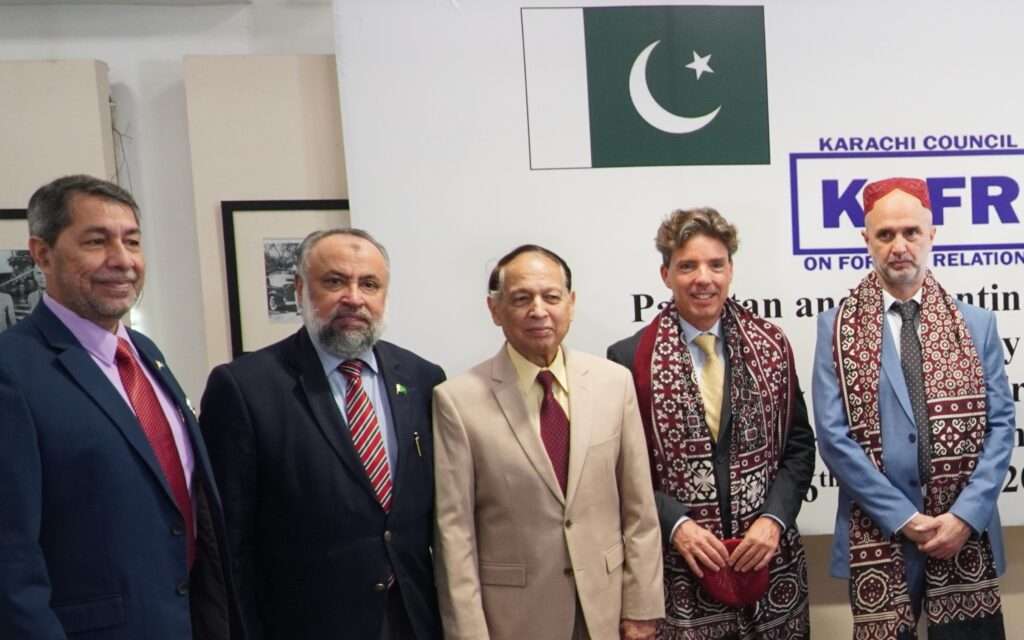
HE Mr. Leopoldo Francisco Sahores: There’s a saying in Argentina, I don’t know if that can be said of Pakistan, that everything changes by the day, but if you leave Argentina and come back 20 years later, public opinion is discussing the same issues like 20 years ago. I don’t know if that also applies to Pakistan.
Dr. Azeem Akbar: Agriculture in an area where there can be a lot of cooperation. Pakistan is basically an agricultural country. Agriculture is now suffering because the population is increasing, so you have to increase the agricultural production but agricultural production is going down because of certain things like land use and excessive water use. Not a lot of technology has been developed to improve the agricultural situation. I’m basically a technologist so I’m looking into all these areas where technological options can bring revolutionary solutions to problems which we are having now, and we will have in the future. I think this is an area where Pakistan and Argentina can really work together to sort out these things and help each other, that is one thing. The other thing which personally I was very interested in from my student days, I was a fan of Maradona and our football is used in the football World Cup, but we don’t have a good football team, whereas, Argentina has won the World Cup. This is an area where I would like Argentina to help us.
Cdr (R) Sadeed A Malik: May I now request you, sir, for your concluding remarks.
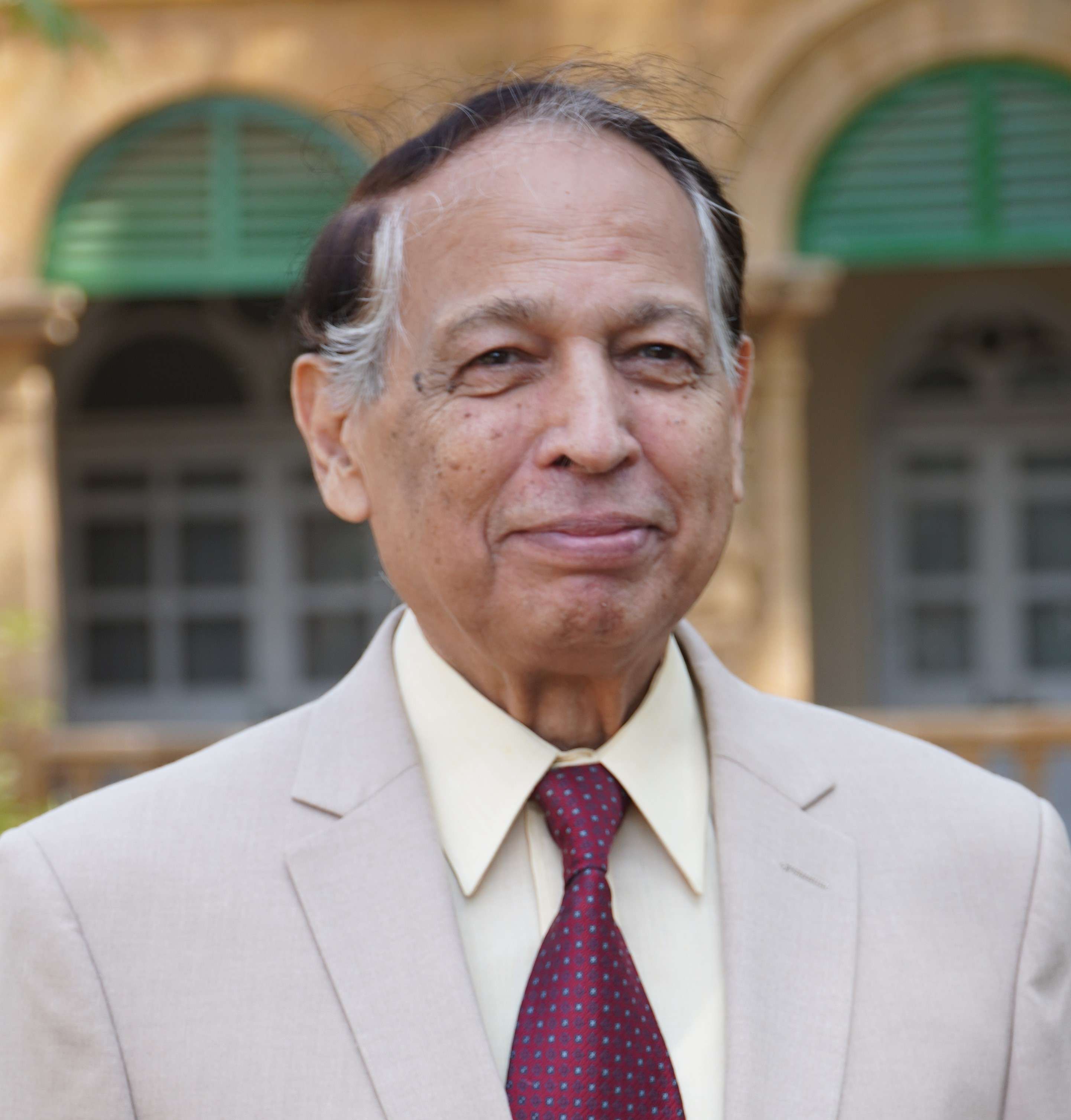
Vice Admiral (R) Khalid Mir, Chairman KCFR: Thank you very much your Excellency, we feel very honored by your presence today, and I have been looking forward to it for some time because we met many months ago, and we had worked out a platform of things as to how it will go on, especially on the agriculture side, and the livestock and so on. I was going to try and ask you some questions on that. Before I do that, on a lighter side, I came to know from the Secretary General here that in your visit to Karachi you wanted to have a look at the Quaid-e-Azam’s Museum, I was delighted to hear that. He went across and asked the curator that you’ll be coming here on so and so date. The curator said it’s a Wednesday and we’re closed on Wednesday. Our secretary doesn’t take no for an answer as you might have learned by now, so he said, but we’ve got to do something about it, because he’s coming here on Wednesday, you’ve got to do something. He said, I’m sorry we can’t do anything. The Secretary said; Look, Argentina is a great friend of Pakistan, and we have to do something about it to show the Ambassador the Quaid-e-Azam’s place and he said, if you want to know something about Argentina, it is seven times the size of France, there are 46 million people, we have a good trade going on with them and they’re very fond of Pakistan. Because they made a park in the center of Buenos Aires called Plaza de Pakistán and we immediately had a park made in Islamabad which is called the Argentina Park, so there’s a lot of going on between us and you stand in between him and the Quaid-e-Azam. So, he said it’s just the way you mentioned it, I can’t say no so you must bring him here. He’s waiting.
I was very happy to hear the tour d’horizon that you did about the entire spectrum of things that you discussed. I was so happy to hear some of the things that came up again, which came up last time as well when you were here, and primarily as you know that we are an agricultural country, there are a lot of things that we have to learn from the Argentinians because they’ve got a tremendous research program going on, on food security, I know that for a fact, and the wheat production, etc. It is something very important for us as it is for them. There is tremendous amount of work, I was just going to request His Excellency to tell us, was there any discussion on the research that you’re doing with our people on the agricultural aspects of this visit.
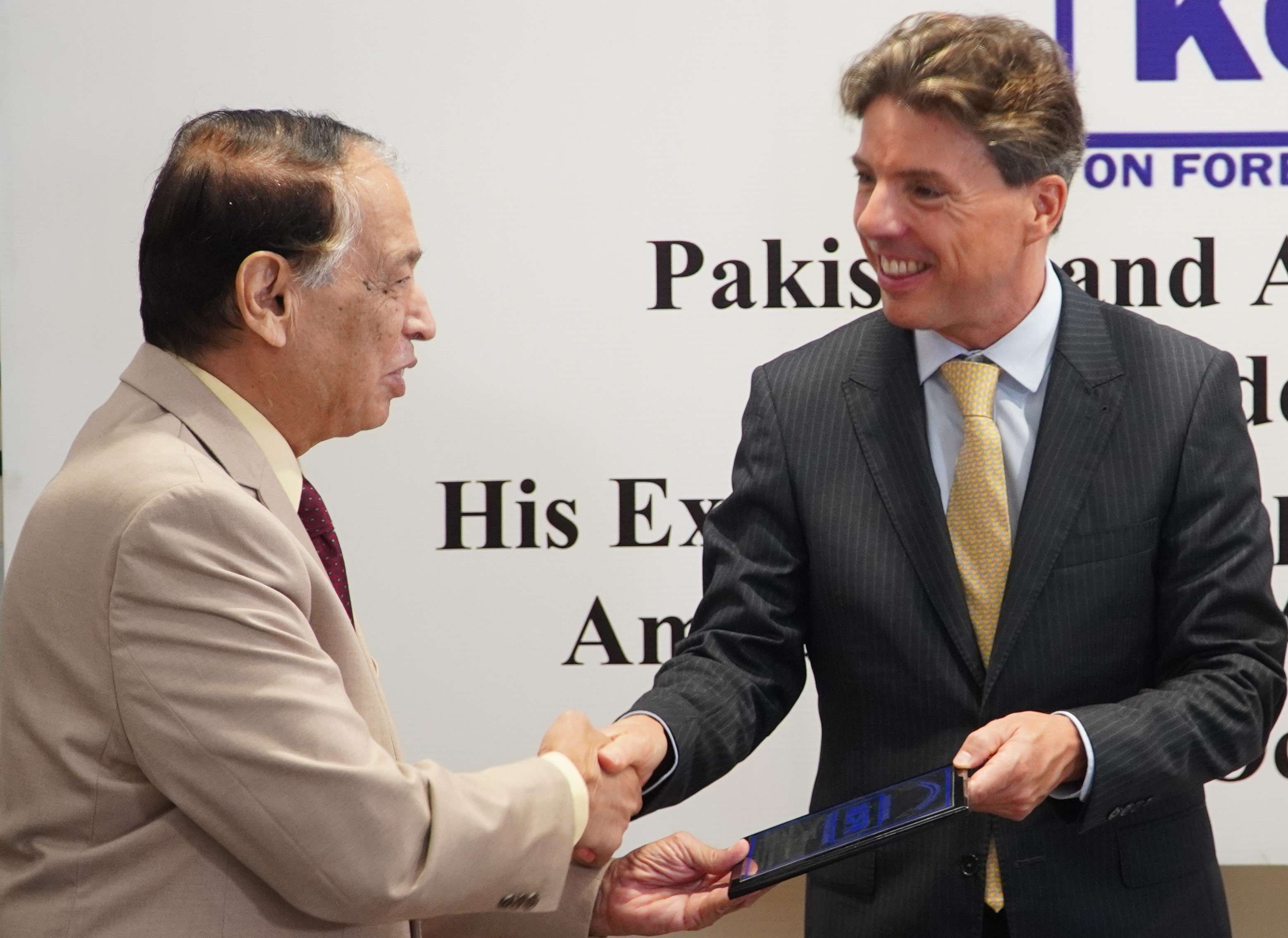
My colleague here is noting down because we’re going to take this up with the council, on the subject so that they can then progress on that because we need some joint ventures.
Because at the moment that’s what’s lacking, joint ventures on research that’s already been done by you, which we can now practice especially in wheat production, for example. You’re reaching the heights in wheat production, we’re not. So, these are the things that we have to do, convey to our people, who can then converse at the government level and we can start moving on that. Because this is something that is very close to all of us. I’m a part-time farmer too, of sorts. Livestock is another one, we continuously suffer with diseases of all sorts in livestock. Even now, there’s one going on in Sindh at the moment, and we are losing so much of cattle, that’s not very good. You have done a lot of research on diseases on the livestock, which we’d like to learn from, because we are having, regularly, every year, the livestock in Sindh especially gets destroyed by these diseases that are coming up. Did somebody take this up with you in the government? On the diseases.
HE Mr. Leopoldo Francisco Sahores: Yes, yes. By the way, we are going to meet the concerned Minister after this meeting, so I’m sure he will shed more light on this. The research visit was mainly about listening from private sector and government sector about what their need, and once we have those clearly identified then we are going to do our research & put them in touch.
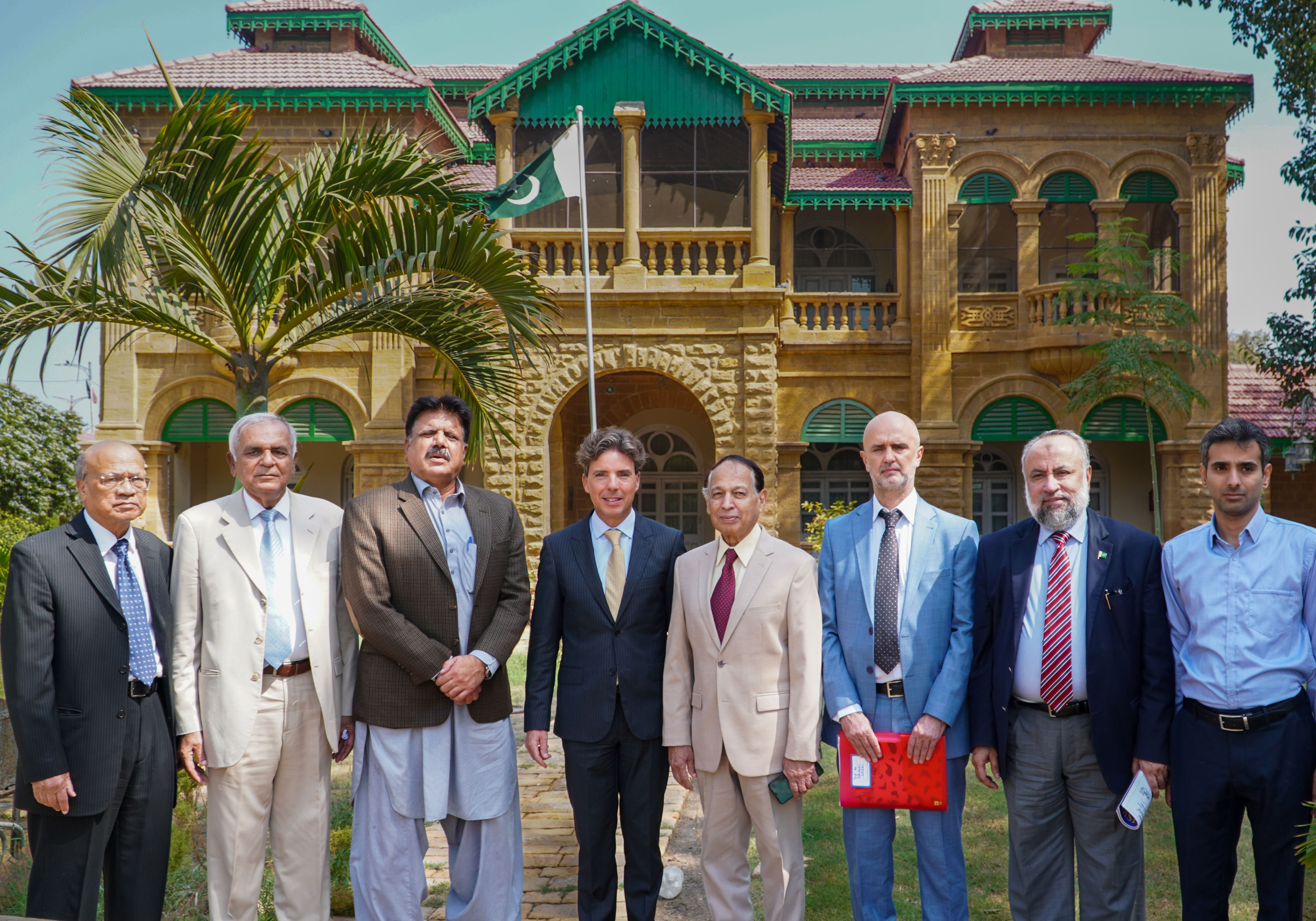
Vice Admiral (R) Khalid Mir: This discussion took place last year as well, to a certain extent, we can now move on from that, as he said, you’ve got to set up a target and then move ahead, and we can act as a facilitator by moving these people on that score, because what I keep on insisting on is transfer of technology because technology in agriculture has become so vast now, as you know, that we are still in the primitive stage, so we have to do something on that score.
On the education side, we have made some memorandums of understanding with the universities the world over, we would also certainly like to have some sort of an MoU perhaps with your institutions which is on the same level that we’re doing on foreign relations. The university level conversation is an important thing that we can have. Now we have MoUs with our local universities here and we could put them in touch with your universities there, so if they can converse with each other, and gain by that.
that’s very important, if you can put us in touch with them, I’d be most grateful. There’s a lot of other things that I wanted to talk about, but I won’t because we don’t have more time because the curator at the Quaid-e-Azam House is waiting.
HE Mr. Leopoldo Francisco Sahores: Just one final thing, talking about success stories, I hope this will be a success but after a webinar, we came to learn this. Yesterday we had a very productive meeting with a Pharma company here, and they have been talking to an Argentine company and they might be able to register six vaccines for livestock very soon, so this is an example.
Vice Admiral (R) Khalid Mir: That’s a good start, I wish we could take that onwards.
Thank you, Excellency, for your time.




